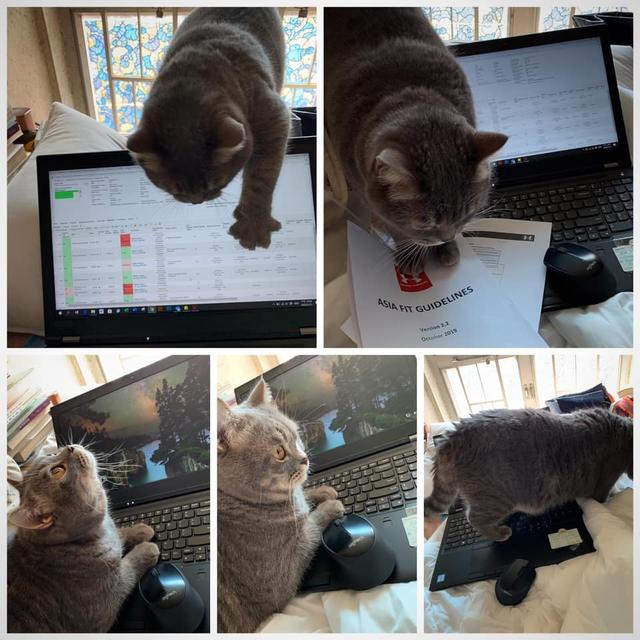Dialogue 1
Jingjing: Mark, do you have anything to say about Covid-19?
京晶:馬克,關(guān)于新冠肺炎你有什么要說的嗎?
Mark: Not more than I've said already. But this quarantine period has sure changed the pace of life.
馬克:沒有更多要說的了。但這段隔離期確實(shí)改變了生活節(jié)奏。
Jingjing: Yeah, outdoors, everything's quiet and peaceful.
京晶:是的,室外,一切安靜祥和。
Mark: Right. Also, people's work schedules are all different.
馬克:對(duì)。人們的工作日程安排也與以往大不同了。
Jingjing: Not everyone. There are some people with the same schedules as before.
京晶:不是每一個(gè)人皆如此。有一些人的工作日程還和以前一樣。
Mark: Of course. But for most people, it means a lot of telecommuting.
馬克:那是自然。但對(duì)大多數(shù)人來說,隔離期意味著大量的遠(yuǎn)程辦公。
Jingjing: Do you like it?
京晶:你喜歡遠(yuǎn)程辦公嗎?
Mark: Actually, yes. I have a really heavy teaching schedule this semester. But I have time to get all my work done, including paperwork, because I don't have to commute these days.
馬克:實(shí)際上,我非常喜歡。這學(xué)期我的教學(xué)工作安排很繁重。但我仍有時(shí)間完成所有工作,包括文書工作,因?yàn)楝F(xiàn)在我不用通勤了。
Jingjing: You've got it made, with an extra ten or so hours in your week.
京晶:利用每周多出來的十來個(gè)小時(shí),你已經(jīng)順利做到了。
Mark: I guess so. Too bad my procrastination habit has gotten worse.
馬克:我想是這樣。但糟糕的是我的拖延癥變得更嚴(yán)重了。
Jingjing: What?! I thought you'd get over it at a time like this.
京晶:什么? ! 我以為你在這樣的時(shí)期完全克服掉了呢。
Mark: I thought so too. With having to commute, I'd put something off if I didn't have time to finish it before leaving the house. Then, I'd have a mental list of things to do late at night or early in the morning.
馬克:我本也這么認(rèn)為。在不得不通勤工作的時(shí)候,如果出門之前沒時(shí)間做完的工作,我就會(huì)推遲完成。然后,在深夜或清晨我會(huì)在腦海里列出一份需要完成的事物清單。
Jingjing: Yeah, so, what's it like now?
京晶:對(duì)啊,那現(xiàn)在是怎么樣的?
Mark: Now, it's hard for me to get started on anything. I know I have plenty of time, so I put things off until right before their deadlines.
馬克:現(xiàn)在,對(duì)我來說啟動(dòng)任何一項(xiàng)工作都很難。我知道我有足夠的時(shí)間,所以我把事情都拖到正好最后一刻完成。
Jingjing: You're suffering from typical procrastination, Mark. I hope you don't fall behind on all your work.
京晶:馬克,你得的就是典型的拖延癥。我希望你沒有落下所有的工作呀。
Mark: So far, it's been OK.
馬克:目前來看還好。
Jingjing: That reminds me of the sentence that's being bandied about these days: How you spend your quarantine predicts how you will spend the rest of your life.
京晶:這讓我想起了最近廣為流傳的一句話: 你如何度過隔離期,預(yù)示著你將如何度過余生。
Mark: Wow, I'd better take heed of that! It's time to get started on some projects!
馬克:哇,我得留意這個(gè)警示! 是時(shí)候開始一些工作項(xiàng)目了!
New words : 習(xí)語短語
telecommute 遠(yuǎn)距離工作 遠(yuǎn)程辦公 家庭辦公,遠(yuǎn)距離工作(通過電話、電子郵件等與辦公室、客戶等進(jìn)行聯(lián)系)
to get work done from home, or somewhere else away from the office
<have/keep/make> a mental list
在腦海中列出將來要做的清單 心中默記出一個(gè)要完成的列表
keep something (to do) in mind, remember it (for sometime in the near future)
<be> bandied about 廣為傳播 傳開
talk about something a lot, rather carelessly and spontaneously

Dialogue 2
Jingjing: Mark, do you want to tell me about the projects you'll start during this quarantine period?
京晶:馬克,想跟我說說你在隔離期間將要啟動(dòng)的項(xiàng)目嗎?
Mark: Not really. If I get something finished, I'll show it to you.
馬克:不是太想說。如果我完成了些什么,我會(huì)給你看。
Jingjing: OK, then. I'll be looking forward to that.
京晶:好吧。那我就期待了。
Mark: Hey, you haven't told me what your workdays are like.
馬克:嘿,你還沒告訴我你的工作日是什么樣的呢。
Jingjing: Well, they're pretty much the same. I have to go in, to do the live broadcast every day. I'm not bogged down with meetings, though.
京晶:好吧,每天差不多也是一樣的。每天我都要上班,做直播節(jié)目。但是不會(huì)被會(huì)議給拖住了。
Mark: I bet that's a relief, Jingjing. I remember you saying you didn't like meetings.
馬克:京晶,我敢說你肯定松了口氣。我記得你說過你不喜歡開會(huì)。
Jingjing: Shush about that, Mark. I don't want my boss to hear. Anyway, few people are particularly fond of meetings.
京晶:噓,可別說了,馬克。我可不想被老板聽到這些。不管怎樣,很少有人特別喜歡開會(huì)吧。
Mark: Some of my colleagues are. They still have lots of meetings online.
馬克:我的一些同事就很喜歡。他們?nèi)匀贿€要開很多網(wǎng)絡(luò)會(huì)議。
Jingjing: I have those also. But it's easier to get other work done while I'm technically attending a meeting—that is, when it's online.
京晶:我也有那樣的會(huì)。當(dāng)我確實(shí)在參加會(huì)議的時(shí)候反而更容易完成其他工作——那就是,開網(wǎng)絡(luò)會(huì)議時(shí)。
Mark: I hope you have a quiet keyboard on your computer.
馬克:我希望你電腦上能有一個(gè)能靜音的鍵盤。
Jingjing: I do. It's a stealth keyboard.
京晶:我用的就是。它是隱形鍵盤。
Mark: Ha ha. Did you hear the joke about the guy who was sad when the weekend was ending?
馬克:哈哈。你聽過那個(gè)笑話嗎? 說的是一個(gè)人在周末快結(jié)束時(shí)就會(huì)很傷心。
Jingjing: Nope. How does it go?
京晶:沒有。怎么說的?
Mark: Sunday night, he was grumpy, but then got a message from his boss, that people only had to go to the office on alternate weeks. Fifteen people on, and fifteen people off, every week for the next month or so.
馬克:周日晚上,他非常暴躁,然后從老板那里收到一條消息,說大家只需要隔周去辦公室。在接下來一個(gè)月左右的時(shí)間里,每周都有15個(gè)人上班,15個(gè)人休息。
Jingjing: Oh, so his weekend turned into another week plus a weekend?
京晶:哦,所以他的周末變成了一整個(gè)禮拜加一個(gè)周末?
Mark: Fantastic news, right?
馬克:這消息絕了,對(duì)吧?
Jingjing: I bet he was happy. Anyway, most people are self-motivated enough to get their work done and to improve themselves. This spring will probably be enlightening for a lot of people.
京晶:我敢打賭他一定很高興。無論如何,大多數(shù)人能通過足夠的自我激勵(lì)完成工作來提升自己。這個(gè)春天可能會(huì)啟發(fā)很多人。
New words : 習(xí)語短語
<be/get> bogged down
<with something> 易感染的,易受影響的,善感的
have too much of something to do, so that you feel slow and overwhelmed (like the feeling of walking through a swamp)
shush 噓(示意安靜下來)
be quiet, don't talk about that
<be> particularly fond <of something> 特別喜歡某事物(常用于否定)
like something (this is often used in the negative, to say politely that a person dislikes someone or something: “I'm not particularly fond of seafood.”)
technically <doing something> 做某事時(shí)意圖做其他事情
can be seen to be doing something, while the person is really paying attention to something else
stealth 隱身 秘密行動(dòng)
very quiet or invisible
enlightening 啟迪 啟發(fā)
helping someone gain great wisdom











